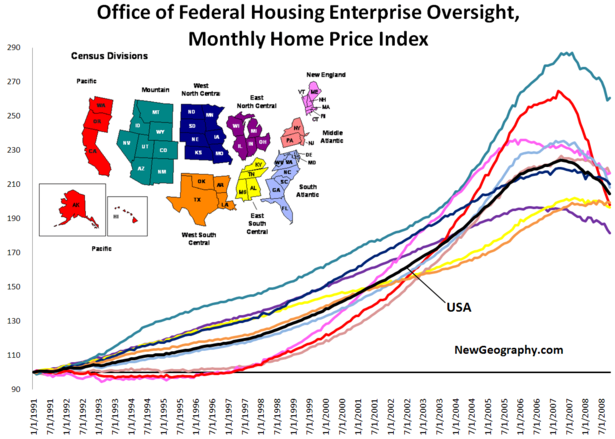Somebody call the New York Times. The national economic meltdown has finally come to Pittsburgh, a city-region where you’ll want to be on the day the world ends because you’ll still have several years to live.
Sunday’s Super Bowl game between the mighty Steelers and the upstart Arizona Cardinals – teams representing regions going in exactly opposite socioeconomic directions since 1950 – has eclipsed all non-sports news coming from Pittsburgh.
Pro football, which Pittsburgh continues to excel at despite 60 years of economic decline, brutal population loss and criminally inept public sector mismanagement, is a seasonal religion every fall no matter how well the Steelers do. But when the Steelers make it to the Super Bowl, as they did this year for an NFL record seventh time, the region and its 2.3 million people are paralyzed by a religious fervor that can be culturally embarrassing.
“Go Stillers” signs appear everywhere. Secretaries, retail clerks and TV news anchors wear black-and-gold Steelers garb on game Fridays and during the playoffs. If Ben Roethlisberger game jerseys had collars, an embarrassing number of professional men would wear them under their suits. The Pittsburgh public schools have instituted a two-hour delay Monday morning in an effort to thwart what should be a severe epidemic of the usual morning-after-Steeler-Sunday-night game flu among teachers. Eat n’ Park, a venerable and highly profitable family restaurant chain that ordinarily wouldn’t close if a meteor struck downtown Pittsburgh, has won enormous goodwill because it’s decided to close at 3 p.m. on Sunday so its several thousand employees can not only watch the Super Bowl but have several hours to prepare the sacred sandwiches and dips and dress up for it. If the Steelers lose, the whole town will be on a suicide watch till March.
Even the Steelers’ success on and off the field could not defend Pittsburgh from the recession forever, however. For the last two months national publications that should have known better (like the Times) came to Pittsburgh, looked around at its service sector-university-government economy, and declared that it was some sort of model for other city-regions because it was apparently recession proof.
Of course, reality turned out to be not so kind. Pittsburgh’s unemployment rate and stable housing prices were relatively better than the national figures only because its deindustrialized economy was already so stagnant that it never experienced fast job growth or a recent real estate boom and therefore couldn’t go bust.
The latest regional numbers, as reported by PittsburghToday.org, a useful web site devoted to documenting the economic reality of the Pittsburgh region as well as boosting it, showed job losses accelerating in December for the second straight month.
Compared to December of 2007, Pittsburgh had 7,500 fewer jobs in December 2008. November’s revised numbers, according to PittsburghToday’s Harold Miller, showed a net loss of 1,600. These numbers, while negative, are minuscule in a region with over 1.1 million jobs. In December jobs were up slightly year-over-year in health care, higher education, professional and business services, mining and construction, Miller reported, but about 10,000 lost jobs in leisure and hospitality, retail and manufacturing offset those gains.
Miller, per usual for a professional civic booster, looked for and found a few relative silver linings in Pittsburgh’s permanently gray clouds: The job loss – 0.6 percent in December – was small compared to Detroit, which has lost 5 percent of its jobs in the last year. And compared to Cleveland – Pittsburgh’s rival in all things, including pro football, population loss and the rate of post-industrial economic decline – the former Steel City did better.
The capital of Steeler Nation lost only 1 manufacturing job in 2008 for every 5 lost by the Cleveland, a city whose hapless Browns finished 4-12. But even if the Steelers – who are narrow favorites – whip the Cardinals Sunday and win their sixth Super Bowl in seven tries, it won’t do much to protect Pittsburgh from eventually being hurt harder by the national recession/depression.













